- Home
- Amanda Flower
Murders and Metaphors Page 7
Murders and Metaphors Read online
Page 7
“No,” Sadie said. “But he could be in the back. A lot of times when I run through the café for my morning coffee, he is in the kitchen. Usually Lacey is the one that gives me my coffee to go. She always knows that I’m coming in. I hope she’s all right. I wanted to ask Danielle more about her, but I didn’t want to be like all those other gossips from the village, running to Le Crepe Jolie with some hopes of more news.”
“You couldn’t be farther from a gossip if you tried,” I said, meaning it. Sadie Cunningham was sweet, actually the sweetest person I had ever met. In all the time I had known her, I had never seen her so much as speak a cross word about anyone, including her good-for-nothing ex-fiancé Grant Morton. Sadie was one of the few people in the village, other than Grant’s own mother, who had a nice word to say about Grant, and he’d broken her heart. That said a lot about Sadie’s sweetness. I, on the other hand, was not nearly as nice and could think of a whole slew of unkind things to say about the younger of the Morton brothers.
“I need to talk to you about this,” Sadie said. “We have to help Lacey. I’m just not sure how we can do it. I’m not sure what an appropriate reaction is when someone’s family member is murdered. It’s just so unexpected. It’s hard to know how to react.”
“She just needs her friends now.” Emerson head-butted my arm. I patted his head. “I should be in the shop most of the day. You can stop by anytime. It’s cold out, so I expect business to be slow.”
“I can’t wait until you open your shop for the day. I need to talk to you now. I’m already at Midcentury Vintage. I’ll be over in two minutes.”
“Sadie,” I groaned. “I was up until three in the morning. Can I talk to you in two hours?”
“I have coffee from Le Crepe Jolie. One with a lot of cream and sugar, just how you like it.”
I groaned again. She might as well have wafted the coffee right under my nose. Le Crepe Jolie made the very best coffee on their French press, and they always loaded mine up with plenty of sugar and cream. Adrien constantly teased me because my cup of coffee was the smallest portion of the beverage.
“And beignets,” she said. “Fresh from Le Crepe Jolie.”
Argh. She knew my weakness for all things sugar, and to add fried dough to that was just cruel.
“Okay, fine,” I said when she slapped doughnuts on the table. “Give me five minutes.”
Sadie laughed and ended the called.
I sat up in bed and found myself surrounded by books and notes. This time Little Women wasn’t among them. After not being able to sleep for so long, I had started to study to defend my dissertation. I wouldn’t travel back to the University of Chicago to defend in person until May, but I wasn’t one to leave schoolwork to the last minute. I never had been, and especially wasn’t now when I was so close to the finish.
The interesting thing about reading my dissertation again was that the topic, the transcendental writers, reminded me that Louisa May Alcott’s philosopher father had been a staunch transcendentalist and close friend of Ralph Waldo Emerson. Emerson even gave the Alcotts money from time to time because the family was so poor and once hired Louisa to teach his own children. It seemed that even when I was trying to pay attention to my own studies, the shop’s essence still got its point across. I only wished it would be just a little clearer as to what that point was.
I knew that Sadie would make good on her threat of two minutes. Midcentury Vintage was just across the street from Charming Books. I rolled out of bed and threw a hoodie over my pajamas.
I spotted Emerson, who now lay lion style in the middle of the unmade bed.
“Sadie is coming.”
He stood up and followed me. Sometimes he behaved much more like a dog than a cat.
I hadn’t even made it to the top of the stairs when the front doorbell rang. Faulkner cried from his tree, “Who dare disturb my rest?” Emerson batted at the tree limb that he could reach, and the crow shook his beak at him. “Be gone!”
This only made Emerson whack at the branch harder.
The doorbell rang again, and I pressed a hand to the side of my head. I was decidedly not a morning person, so it was far too early for me to referee a crow-versus-cat argument. I continued down the spiral staircase, taking care in my haste not to trip and fall to the bottom. The original hardwood floor of Charming Books was not a forgiving place to land.
The doorbell rang a third time before I reached the door and threw it open.
“Violet!” Sadie cried. “What took you so long? I thought something had happened to you. I almost called Chief Rainwater again.”
The right side of my head where the ache had begun started to throb. “Sadie, I was all the way upstairs in my apartment. It took me a couple of minutes to get moving.”
“I’m so sorry about that. Did I wake you up when I called?” Her voice was anxious.
“Yes.” When she looked like she might cry, I added quickly, “It’s fine. I’m glad you woke me. I have a lot to do today. I might have slept for another two hours at least.” Just saying that I might have slept for another two hours sounded like a dream come true. I could hear my bed calling my name from the second floor.
“Coffee?” She held out one of the cups to me.
“Yes, please,” I said, barely above a whimper. I took the cup and held it under my nose. I knew Adrien had made it just how I liked it.
Sadie bustled into the room with the second coffee in her hand and a white bakery box with a Le Crepe Jolie signature sticker on it taping it closed. My mouth watered just seeing the box. I knew all kinds of goodness lay in wait for me there.
Of all the friends I had in my life, none of them took fashion as seriously as Sadie. Even on her worst days—and she’d had some bad ones since we’d met—she dressed to the nines. Today’s outfit was a mint-green coat with a Peter Pan collar and fake pearl buttons. At least I guessed the pearls were fake. She wore the coat over a gingham dress complete with petticoat underneath. She’d paired the dress with black patent-leather heels. Sadie had just walked across the ice-covered River Road, one of the last original brick streets in Cascade Springs, in those shoes. I wouldn’t have been able to walk across the room in them.
As River Road reached the Niagara River and turned left to follow it, it became blacktop. That section of River Road had the highest traffic in the village, so it was impractical to have brick there, but the brick added charm to our portion of the busy street. Most of the year, the brick was fine. During the winter, it was a pain, because the road could never be completely cleared of snow and ice, which was the reason I was aghast that Sadie had walked across the street in those shoes.
I sipped my coffee and felt a little more human again. At least I felt human enough to have a rational conversation. “How did you cross the street in those shoes?”
She laughed. “These shoes are nothing. They have a thick heel. I couldn’t fall over in these if I tried.”
“I could,” I said. “Without trying at all.”
“Tell me what happened at the winery.” She perched on the arm of one of the two couches that flanked either side of the stone fireplace that faced the tree. After another sip, I set my coffee down on the table and knelt by the hearth. I could at least start a fire while we talked. Customers loved the fire in the winter months. It made them want to stay longer in the shop, and the longer they stayed in the shop, the more likely they were to buy something.
I shoved pieces of newspaper between the logs and put a fresh log on top of the pile. Using a long-handled lighter, I lit the fire, and the flame caught the log. I smiled in satisfaction as I put the grate back in front of the hearth.
Sadie opened the bakery box and set it on the coffee table in front of the couch. She’d even thought to bring a little stack of napkins. Most of the time I wished I could be half as organized as her.
I stood up and sat between the fire and the beignets, holding my coffee. Life really didn’t get much better than this.
I selected a p
astry from the box, and as soon as I bit into it, I knew why Lacey had married Adrien. He had many wonderful qualities, but his doughnut-making skills were off the charts. Between bites, I told Sadie what had happened at the winery. When I got to the part about finding Belinda’s body, the image came back to me so vividly that a piece of beignet lodged in my throat.
“That’s awful,” Sadie said. “No wonder everyone is talking about it. How terrible for the Mortons to imply that she did this.” She pressed her lips together. “I expected as much from Mrs. and Mr. Morton, I suppose. They care a lot about their family, and I’m sure are just trying to protect their home and business. But I know Grant would never say anything like that about Lacey.”
I shoved another beignet in my mouth to hide my expression. I wished that Sadie could see Grant for who he truly was, but this was a case where her good nature got in the way. They had broken up three months ago, but she was just as much in love with him as she ever had been.
Sadie selected the smallest beignet from the box. “Do you think Rainwater will miss the Red Inkers meeting tonight? Renee Reid and Simon Chase, our new candidates, will be presenting for the first time. He really should come if he can. He can’t let Richard and me make the decision on our own.”
The Red Inkers was a local writing critique group that met in Charming Books twice a week after the shop closed. They had been using the meeting space for years, long before I’d returned to the village. Last fall, two of the members had left the group rather suddenly, and it had been a very long process to find new members who meshed well with the current group. The current members were Sadie, Chief David Rainwater, and Richard Bunting, my English department chair at the local college, Springside Community College. I supposed that, since I attended the meetings because they were in the bookshop, I was an honorary member of sorts. I wasn’t a creative writer, but I did enjoy listening to the others share their work.
Of the two new potential members, Renee Reid, I was certain, would be a good fit for the group. She was a librarian at Springside who had befriended me when I started teaching there as adjunct professor in Richard’s department. It wasn’t until Richard had emailed all the Red Inkers to tell us who had submitted works for review that I had learned that Renee wrote. She’d never mentioned it to me before, and Renee wasn’t a person to keep her own secrets.
But knowing Renee and how smart she was, I wasn’t the least bit surprised her piece was one of the best in the bunch. The only one I would have said was a tad better was the piece by Simon Chase, whom I didn’t know at all. In fact, Simon was completely unknown to everyone in the group. This was most surprising to Richard, because as chair of the English department at Springside, he saw himself as an expert on what was happening in the world of literature in the entire Niagara region.
But he did admit that Renee being a writer had taken him too by surprise, especially since he was half in love with the boisterous college librarian and made up every excuse he could think of to visit the college library as often as possible. No one had more overdue books than Richard Bunting.
Sadie wrinkled her nose. “It feels strange to let new people into our group. We have been together so long and know each other’s writing so well. What if I have nothing constructive to say about Renee or Simon’s writing, or what if they hate my style? I would be devastated if they trashed my work.”
“First of all, you’re a great writer, Sadie, and you know your stuff. You’ll think of something helpful to say to these other writers. Second of all, I know Renee. She is loud and outspoken, but more than that, she is kind. She will tell you what she thinks, but she won’t trash yours or anyone else’s works. Third of all, we don’t know Simon, but I seriously doubt that he would say anything to upset you or Richard or Rainwater early on. He’s the one who wants to join your group, remember? He’s not going to do anything to hurt his chances.”
She grabbed my hand. “But you will be there at the Red Inkers at least and will give us your honest opinion? Even though you don’t really get to vote, your opinion matters to all of us.”
“I’ll be there,” I said.
Sadie thought about this a moment. “Still, I really hope Rainwater will be there. I don’t want it to be up to Richard and me to make the decision to see if Simon is a good fit. Rainwater is so wise. He will know what to do.”
“I’m sure you will know even if Rainwater isn’t at the meeting. He will have his hands full now with the murder.”
Sadie shook her head. “Another murder. I can’t believe it. It seems the grim reaper has been a frequent visitor to our little village over the last several months, and I feel just terrible for Lacey.”
“Me too. Do you know anything about Lacey’s relationship with her sisters?”
“What do you mean?” Sadie’s already big blue eyes went wide.
“Did they get along? Do you know her other sisters?” I asked.
Sadie thought for a moment. “Both of her younger sisters have shopped in my store. But Michelle, the older of the younger two, more frequently. She had a couple of kids with her the last time she was in, so I assumed that she was married. I could be wrong about that. I knew that she was Lacey’s sister, but every time I mention Lacey, she changes the subject.”
“And the youngest sister?” I asked. “Adele? I think I remember that was her name.”
“Right. Adele is nineteen. She’s an artist. When she came in Midcentury Vintage, I didn’t have anything that was her style. She’s a little edgier than the stuff that I sell, but she gave me her card and told me that she had her own studio in the bird neighborhood and I could stop by anytime to see her work. She thought a piece or two would look nice in my shop. She wondered if I would sell her artwork on consignment. That was weeks ago, and I haven’t been over there and haven’t had a chance to seriously think about it yet.”
The “bird neighborhood,” as everyone in the village called it, was the eclectic arts district in the village, full of art studios and galleries catering to the many tourists who made their way through the village every year. I was surprised that someone so young would have an art studio over there. The rent was steep.
“She’s nineteen and has a studio in the bird neighborhood? Does she do anything else to pay the rent?”
Sadie shrugged. “She didn’t say, and I didn’t ask.” She stood up. “I should head back to my shop and get ready for the day, and um, you probably want to get ready too.”
I touched the messy bun on the top of my head. “It’s that bad, is it?”
“You always look nice, Violet.”
I chuckled and stood up too. “Sadie, if I didn’t know you better, I would swear you were lying.”
She looked aghast. “I would never lie!”
I laughed. “I never said that you did.”
Chapter Eleven
Grandma Daisy and I had a rush of customers in the morning, but most were there for gossip about Belinda Perkins’s death. The copies of her book that we had left from the signing sold out by eleven. I handed an elderly woman the copy of the wine book she had just purchased.
She smiled at me. “I’ve never taken a drop of spirits in my life. My father always said liquor was of the devil.”
I pressed my lips together. “Can I ask why you bought the book, then?”
She pulled on her leather gloves. “It will be a collector’s piece now that the author is dead.”
After the customer left, I went in search of my grandmother, who was dusting the bookcases in the back of the shop near the kitchen.
“All of the copies of Belinda’s book sold,” I said.
She held her feather duster in the air like it was a wand and she was about to cast a spell on me. The only spell she could have conjured would have been allergies if she shook that duster in my face. I took a step back to get out of range, just in case.
“All of them.”
I nodded.
“Should we order more? Would that be crass?” she asked.
“I doubt the publisher would think so.”
She pressed her lips together in thought. “Well, if anyone really wants the book, you know the shop will materialize a copy for him or her.”
I knew that all too well. I straightened a book on the shelf closest to me. “The shop has quieted down now that all the gossips have left and gone somewhere else to find their news. I think I will head over to Le Crepe Jolie to see how Lacey is.”
“Why would she be at the café today of all days?”
I shrugged. “I don’t know what time she got there, but when I texted her a little while ago, she said that she was at work.”
“Poor child. She’s been through so much. I hate to see this latest tragedy disrupt her life.”
“Are you thinking of her mother?” I asked.
Grandma Daisy nodded. “Lacey lost her mother young, just like you did. Not as young as you were, but young enough.”
“How did her mother die?” I asked. I knew that Lacey’s mother had died while I was away in Chicago, but not the particulars.
“I thought that you knew, dear. Lacey and you are good friends. I thought that she would have told you.”
“Any time that her mother came up, she changed the subject. I got the feeling that she didn’t want to talk about it, and I didn’t want to pry,” I said.
Grandma Daisy lowered her feather duster and shook her head. “Car accident coming home from work in Niagara Falls on a cold winter’s night, just like the one we had last night. Her car slid on black ice on River Road, and she hit a tree.”
“Did she die instantly?”
Grandma Daisy frowned. “Not from what I heard, but the family was very private about it. I think she died a week after the accident. I went to the funeral, of course; most of the village attended. Nela Perkins was well loved. She was a tough, hardworking woman, raising those four girls on her own. Her husband left her when the youngest, Adele, was still in diapers. The girls were just devastated. They adored their mother.”

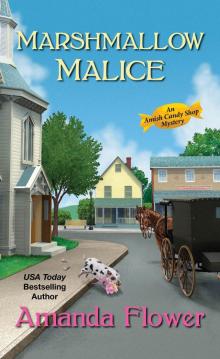 Marshmallow Malice
Marshmallow Malice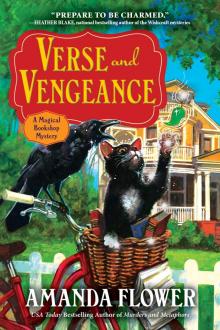 Verse and Vengeance
Verse and Vengeance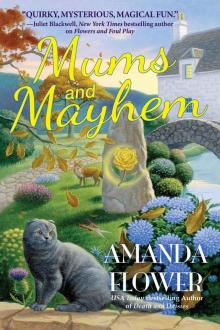 Mums and Mayhem
Mums and Mayhem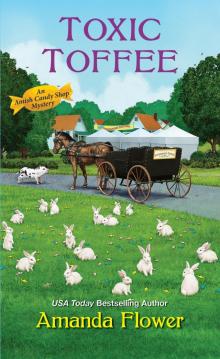 Toxic Toffee
Toxic Toffee Criminally Cocoa
Criminally Cocoa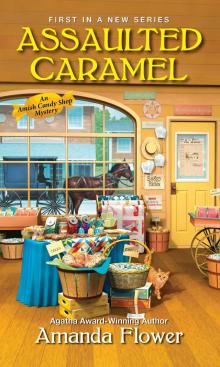 Assaulted Caramel
Assaulted Caramel Maid of Murder aihm-1
Maid of Murder aihm-1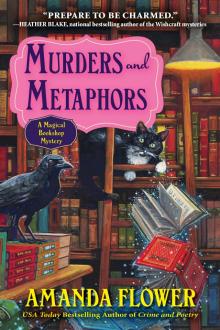 Murders and Metaphors
Murders and Metaphors Matchmaking Can Be Murder
Matchmaking Can Be Murder Maid of Murder (An India Hayes Mystery)
Maid of Murder (An India Hayes Mystery)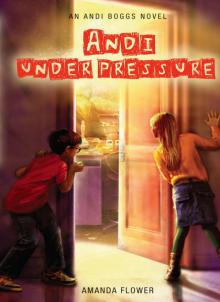 Andi Under Pressure
Andi Under Pressure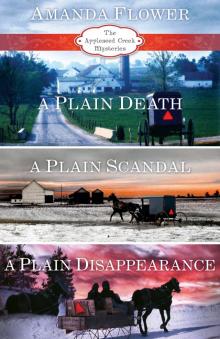 Appleseed Creek Trilogy, Books 1-3
Appleseed Creek Trilogy, Books 1-3 A Plain Disappearance
A Plain Disappearance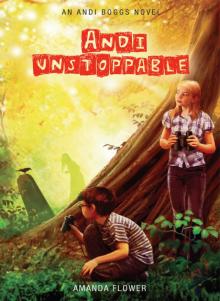 Andi Unstoppable
Andi Unstoppable The Final Vow
The Final Vow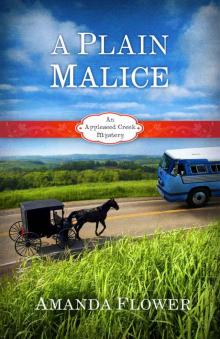 A Plain Malice: An Appleseed Creek Mystery (Appleseed Creek Mystery Series Book 4)
A Plain Malice: An Appleseed Creek Mystery (Appleseed Creek Mystery Series Book 4)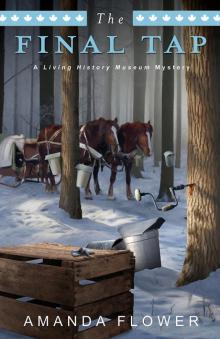 The Final Tap
The Final Tap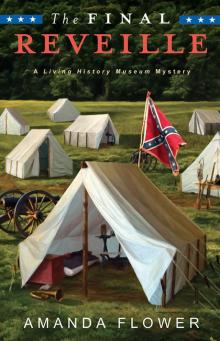 The Final Reveille: A Living History Museum Mystery
The Final Reveille: A Living History Museum Mystery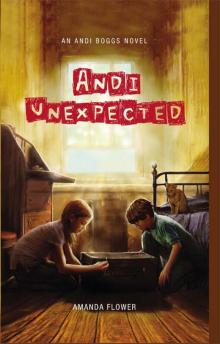 Andi Unexpected
Andi Unexpected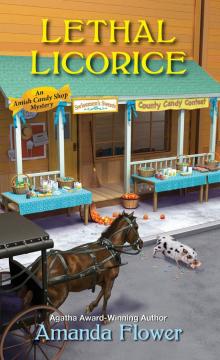 Lethal Licorice
Lethal Licorice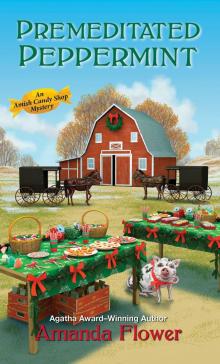 Premeditated Peppermint
Premeditated Peppermint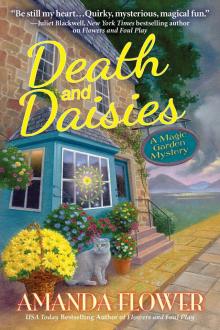 Death and Daisies
Death and Daisies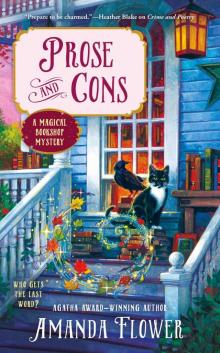 Prose and Cons
Prose and Cons